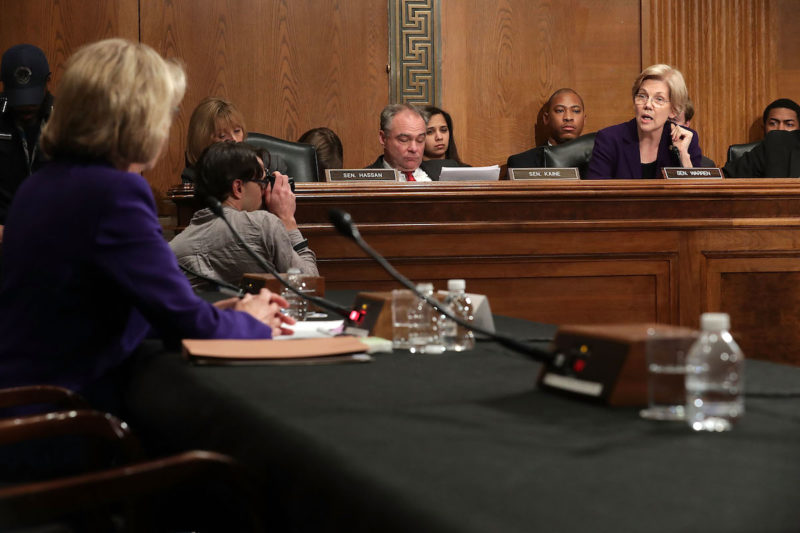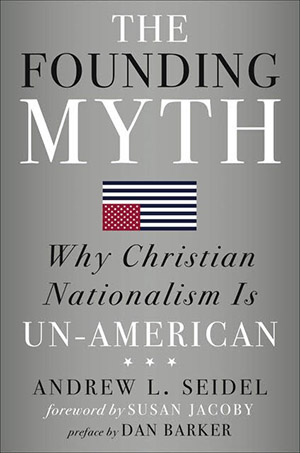Senators Can and Must Ask About Nominees’ Religious Beliefs
Questioning federal nominees on religion has been decried as a violation of the Constitution's ban on religious tests. But not only does it do nothing of the kind, there’s good reason to think Article VI actually requires these questions.

The old rule tells us that politics and religion are not to be mentioned in polite conversation. In an effort to ease nomination hearings for some of President Trump’s more extreme nominees, conservatives—and at least one Democrat—are seeking to graft this rule of etiquette onto the Constitution.
The new political attack is just that. And it’s inelegant: If a senator mentions a nominee’s religion in anything other than glowing terms—even if the nominee has written extensively about how religion influences their work in regressive ways—that senator is accused of religious bigotry. The goal? Suffocate hard questions to get more conservative religious officials in office.
The political assault is billed as upholding the ban on religious tests in Article VI of the Constitution. But not only does it do nothing of the kind, there’s good reason to think Article VI actually requires these questions.
When Sen. Sanders questioned a nominee who once wrote that Muslims “have a deficient theology,” Sanders unknowingly inaugurated “the anti-religious crusade of the left.” People took notice—attacking Sanders as a religious bigot was effective.
Then, Sen. Feinstein and Sen. Durbin questioned Amy Barrett, who was up for a lifetime appointment on the federal bench, because Barrett wrote that Catholic faith should sometimes trump a judge’s oath of office. Such questions were “anti-Catholic bigotry,” according to the U.S. Conference of Catholic Bishops, and criticism from the right intensified.
In December, Sen. Hirono and Sen. Harris questioned a judicial nominee who is a longtime member of the Knights of Columbus, a conservative Roman Catholic men’s club known for injecting religion into our government and public schools (it helped insert “under God” into the Pledge of Allegiance in the 1950s). The group takes extreme and extremely conservative stances on issues that are sure to come before any judge—it even intervenes in cases, including some I’ve worked on. The Washington Post ran Michael Gerson’s op-ed, “Anti-Catholic bigotry is alive in the U.S. Senate,” in response. (Gerson wrote something similar about Feinstein and Durbin.) Fox News agreed.
For asking these questions, Rep. Tulsi Gabbard accused her fellow Dems of “weaponizing religion” in an op-ed for the Hill, inadvertently revealing that this new line of attack is about politics, not the Constitution. Gabbard, who told CNN she was running for president three days after the op-ed was published, will face tough questions on the campaign trail because she grew up in what some have called a cult. Gabbard’s clumsy op-ed was intended as a political inoculation; she’ll vilify any attempt to ask critical questions about her religion.
The cries of religious bigotry continued this week when Senator Ted Cruz attacked Cory Booker for a “theological inquisition” (somewhat redundant phrasing) and claimed to see a “growing pattern among Senate Democrats of hostility to religious faith. … Senate Democrats attack what they have characterized as religious dogma … Senate Democrats attack nominees for their own personal views on salvation.”
For Cruz, religion is “no business” of the committee. But it absolutely is. Cruz has made religion a central part of his political appeal and the justification for many of his more conservative positions. The same is true of these nominees. As Senator Whitehouse said today, “It absolutely is the business of this committee to make sure that nominees who seek judicial office in the United State of America will leave their religious beliefs in the robing room and not bring them up onto the bench . . . Our courts are not temples to any god, but temples to law and justice.”
In short, some nominees have made their religion the business of the committee.
Cruz berated Booker for questioning Neomi Rao, who Trump nominated to fill Kavanaugh’s vacant seat on the DC Circuit. In 2008, Rao chastised the Supreme Court for favoring the rights of two consenting adults over religious sexual mores. The intimation was strong there, and in her other writings, that secular law is wrong on LGBTQ (and other) issues, and religious law is correct. These issues would likely come before Rao if she were a judge, including in the context of religion colliding with LGBTQ rights. So Booker asked if Rao thought gay relationships were immoral or sinful. Booker wasn’t just grilling Rao about religion, he was asking about her ability to be a fair and impartial judge.
But our Constitution bans religious tests! Almost every denunciation—including those by Ted Cruz, Tulsi Gabbard, Michael Gerson’s hyperbolic op-eds, Fox News, Ben Sasse, and more—relies on Article VI of the Constitution. Article VI is sublime. First, it declares the Constitution the “supreme law of the land,” and lays out the two provisions that are important in this discussion. First, it says that state and federal officials “shall be bound by Oath or Affirmation, to support this Constitution.” The next clause immediately adds, “but no religious Test shall ever be required as a Qualification to any Office or public Trust under the United States.”
The central question in any Senate confirmation hearing is whether a nominee can uphold her oath of office and treat the Constitution as the “supreme law of the land.” Answering that question is especially critical when a nominee has previously claimed that her private faith can trump her public duty. The problem is not that the nominee is religious or of a particular faith, but that she has stated a willingness to act in defiance of her sworn duties based on those beliefs. And the problem does not go away simply because the source of the conflicting belief is religion.
We can go one step further. When a nominee makes religion relevant to their ability to uphold her oath, senators must quiz the nominee until the nominee assures the Senate that her previously stated beliefs won’t hinder the office. So when Sen. Sasse offered a resolution to “unanimously reaffirm our oath of office to a Constitution that rejects religious bigotry” to rebuke Harris and Hirono, he missed the mark. Sasse’s oath requires him to investigate nominees who would elevate their personal religion over their public duty to ensure they won’t.
Imagine a Quaker, a pacifist, up for a Senate-confirmable military post. It would be odd if he were not asked about his pacifism—a dereliction of senatorial duty, even. Nominees must be able to do the job for which they are nominated. It’s the Senate’s duty to determine whether they cannot, even if their impediment stems from religion.
Gabbard cannot be immune to questions about how her religion will influence or impact her ability to govern, simply because she will now cry bigotry. A vetting system that allows candidates and nominees to selectively insulate their weaknesses and extreme positions by grounding them in religion is impotent.
Questions of religion are fair game the moment nominees argue that their duty to their god is superior to their duty to this country. The issue is not the religious belief itself, but the ability of that nominee to honor their oath of office. If they cannot, We the People have a right to know. And the Senate has a duty to ask.


